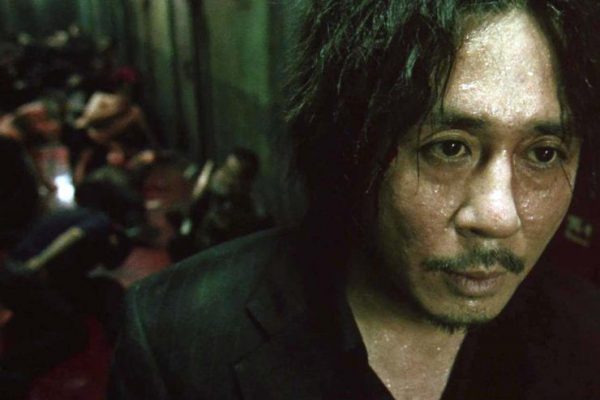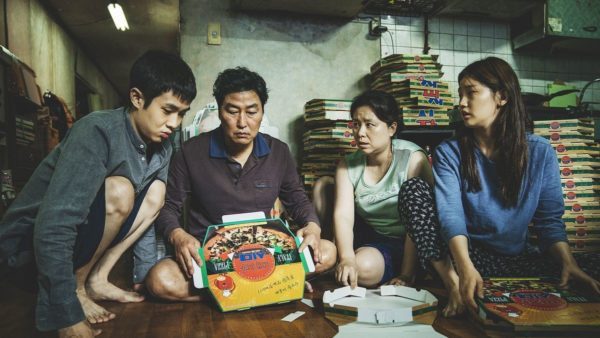Tom Jolliffe looks at the booming worldwide popularity of Korean film and TV. With the Western studios so preoccupied with IP, are we getting more engaging films and shows from Korea?
German cinema in the 30’s. American noir in the 40’s. Japanese cinema in the 50’s. Nordic cinema from the 50’s and 60’s. British cinema in the 60’s. European cinema in the 60’s-70’s. American’s second golden period from 68-78. Japanese horror from 97-2003. Across the world of cinema, there seem to be cycles where regions or nations have a purple patch. It could be a blossoming period across genres, or a particularly strong impact on one genre (Italian Horror in the 70’s). No one can consistently hit their A-game for too long. That barometer swing that shows us just how many great films lay among the masses of released material, occasionally suggest a nation is struggling to find great material. Across the west, the early part of this century seemed a struggle, whilst mainstream American cinema is now nothing if not predictable (where everything is dominated by existing intellectual property). Then just like film, the same is true of TV. 24 seemed to kick start a new era of high quality, high production value (and A-list backed) American TV, which maybe is just tailing off a little, whilst Europe and the UK are delivering some great work in recent times.
This is the all too dangerous game of generalisation and subjectivity of course, but I had an epiphany recently. Korean film and TV is pretty darn good at the moment. I’d been more predominantly interested in the cinematic side of Korea’s entertainment output, and they’ve seemed to be creatively vibrant since the 90’s now. In the early part of this century, Oldboy really kick started a new fascination with Korean cinema. In the wake of Park Chan Wook’s revenge opus, audiences in the West had a new found interest they hadn’t prior. They seemed to tail off and perhaps somewhere between 2005-2015, even the mighty Korean auteurs were having a period of creative dryness. Japanese cinema had something of a drop, almost coinciding (and maybe not surprisingly) with economic downturn 10-15 years ago (after a great period of wonderful cinema). That’s not to say we still don’t see great works in the ‘down’ times, but there seem to be these time periods where there’s an almost warming consistency in home runs coming out from particular parts of the world. As a western viewer too, it may well be that I’m only privy to the mainstream Korean entertainment. So if we’re properly comparing, perhaps it’s more astute to say that these are the alternatives to America’s Marvel heroes, Disney projects and whatever else dominates the West’s mainstream.
Like many, my Korean fascination was reignited a couple of years ago with the worldwide success of Parasite. I’d been aware of Bong Joon-ho but ironically more perhaps because of his Western co-productions, Snowpiercer and Okja. Both great. Parasite was a superb achievement though. A film that was thematically engaging, artistically dazzling, creative and technically astounding. Additionally, it was a layered film with nuance and a wonderfully witty edge. It seemed all too rare for a film to have surprises any more. It seemed rare that a script could still take us one direction and flip us into another (even as far as tone and genre) so skilfully. It was surprising, brilliant cinema and it felt like a reminder that Korean cinema had been doing this 10 years prior, whilst a lot of Western cinema was increasingly leaning on predictability (because in truth, mass markets want this). I’ve recently spoken of there being something of a disposable nature to a lot of mainstream cinema (particular coming from the dominant Western markets). Parasite isn’t a film to be watched and to dissipate into the ether like a blind drunken half memory. Parasite, even compared to other recent Oscar winners, was a film with growth potential, to be re-watched and reanalysed. Something I could appreciate for those caveats of artistry that call for repeat viewings and among all of this…highly entertaining too.
SEE ALSO: Parasite and Snowpiercer: Class divides with Bong Joon Ho
Parasite started the ball rolling on a targeted run of Korean films, going right back to the 40s (there’s hundreds of free films on YouTube through the Korean film archive). Aside from discovering some contemporary films I’d missed and getting a glimpse of the classic era (much of which was a little quaintly hampered by censorship), I noticed something. For five years now, Korean cinema has been batting out some exceptional films. Park Chan-wook hit top form again with The Handmaiden, a sumptuous erotic thriller (with a glorious score I’m currently listening to as I write) playing out in Rashomon format. Maybe they hadn’t dropped their levels too much, but certainly, from 2015-16, it feels like they’re stepping up a level again. As it happens too, Netflix is well stuffed with material, and it’s here, in a Korea fascination in visual medium which runs parallel with the Western fascination with K-Pop, that I found several more unique, memorable and repeatable works, such as The Wailing. I’m always drawn to folky horror and Asian cinema, particular Korea and Japan has historically been well stuffed in folk horror (likewise so much Nordic folk horror).
Then I watched a film which has had an even more profound effect on me than Parasite did. Burning was a languid and placidly paced film, sparse on moments of action, which retained a wilful sense of enigma throughout. Every time Lee Chang-dong teased a reveal, he put out something to contradict, as life in reality would tend to. Additionally he took a film and swayed us through three acts which almost traversed different tone and genres, leading to a dark, psychologically complex final third. The extent of the complexity doesn’t even hit you until after the credits roll, maybe some hours, days, weeks after, and lure you to re-watch, and re-watch again. A film as those credits roll, I felt frustration toward and some indifference, would become an all time favourite within a week. Something had been left, a lingering ‘burning’ thought. It’s this kind of cinema, which sneaks up on you, even after initial indifference, and leaves you invariably addicted, that I love. A great pickpocket leaves you only realising they’ve robbed you blind when you reach for your wallet the following day. It’s an ambiguous, challenging and complex masterpiece, and exactly the kind of film that almost never gets made in a market putting most of its money into Disney projects.
SEE ALSO: So many Burning questions
Then there’s TV. Western streaming services are well packed with K-Dramas and additionally some great high concept Dramas. The biggest streaming surprise of the year might just be Squid Game. Yes that’s Squid Game. There’s three people on Earth yet to see it. I’ve been feeling a little like series of late aren’t quite as bingeable as they were 5-10 years ago. Maybe it’s the mass of options which are cancelling each other out. It might well be too, that we’re also seeing IP beginning to filter more and more significantly into streaming platforms. Almost everything Disney produces across its film and TV is based on existing IP. I loved Mandalorian, but am I going to be as enamoured with the innumerable other Star Wars spinoff shows that are coming, or the never ending array of Marvel character shows. Mike Flanagan at least, is flying the flag for engaging and repeatable series over on Netflix, but many of the other American produced are becoming a little less interesting as more money seems to be getting ploughed into tent-pole Netflix movies like Red Notice now. Once Squid Game ended, I was left with a sense of emptiness I’d not felt since ending Breaking Bad years before. “What the hell do I watch now?” A few attempts that didn’t get too far (Alice in Borderland) and some series finished which were good, but not quite Squid Game. So what was the logical option? Well…to see what else Korea had to offer.
SEE ALSO: A Squid Game-inspired Movie Triple Bill: Cube, The Running Man, and Battle Royale
Hellbound proved a very watchable and engaging end of days show which blended horror with commentary (Korean creators at best always seem to have an underlying commentary on any out of class, religion, patriarchy, conglomerates and more). Okay, it wasn’t Squid Game but like I’ve noticed in much of Korean cinema and TV’s recent finer works, there’s committed performances, emotional connection and great cinematography too. You’re always made to care and there’s a tendency for us to linger on moments and have time to digest a look, a reaction. We’re given leeway to actually pay attention to the actor and not this fidgety need to cut away which can inflect a lot of American film and TV, edited to cater for what might be deemed (wrongly I might add) an audience with low attention spans. Often we’re not given time to appreciate or care for characters. As far as Mike Flanagan again, his choice for having a laboured pace and long monologues was a point of contention in Midnight Mass, but the truth is, it was this creative choice that gave us the investment to care for characters.
SEE ALSO: Read our review of Hellbound here

Another recent Korean series I just finished was a hearty mix of The Departed, Raid, John Wick and John Woo. My Name, an action packed and thoroughly engaging neo-noir action show has all the stylistic trappings and glorious imagery you expect. It’s also anchored by a perpetually arresting performance by Han So See. Gripping from beginning to admittedly predictable end, My Name is also blessed with some of the finest TV action design you’ve ever seen. At its core though, it’s about emotional investment and drawing moments of pain and anguish out in the protagonist. Sadly, the question now is…what do I watch next?
SEE ALSO: Ten Essential Korean Cinema Gems
As for my original question: Is Korea winning at film and TV right now? I think it’s gunning for Gold. Let us know your thoughts on our social channels @flickeringmyth…
Tom Jolliffe is an award winning screenwriter and passionate cinephile. He has a number of films out on DVD/VOD around the world and several releases due out in 2021/2022, including, Renegades (Lee Majors, Danny Trejo, Michael Pare, Tiny Lister, Nick Moran, Patsy Kensit, Ian Ogilvy and Billy Murray), Crackdown, When Darkness Falls and War of The Worlds: The Attack (Vincent Regan). Find more info at the best personal site you’ll ever see here.


















